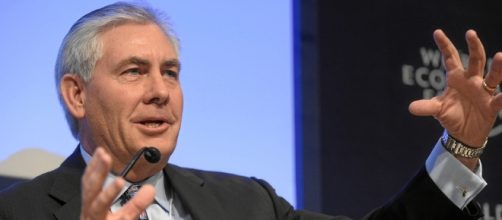The Secretary of State is the most important and influential position of any Administration and is now even more so with a new President lacking direct knowledge of the workings of government and public Administration. In other countries the position in known as the Foreign Minister and has the responsibility to putting into action the country’s policies with both allies and adversaries. With the controversial start of Donald Trump’s Presidency the position has become more important than it had been in decades.
From the Board room to the Oval Office
When President #Donald Trump nominated the C.E.O. of ExxonMobil Rex Tillerson as Secretary of State the decision was guaranteed to raise eyebrows not only in the United States, but also around the world, as the nomination was proof of the determination of the new President to bring big business practices into the Oval Office.
The confirmation hearings dealt with possible conflicts of interest due to his previous position and lack of direct diplomatic experience. While he has dealt with many of the world’s leaders in the past these have been business related encounters and now after the confirmation of his new position the future meetings with them will be vastly different in tone and language from those the previous encounters.
The State Department which he will lead is not fully prepared for its new secretary after the resignations of a number of senior personnel at the direction of the White House. These positions have yet to be filled and currently many others are still held by former Obama staff in anticipation of the new nominations. This is a normal situation for changes of Administration, but another factor has marked the beginning of his Term and it signals potential problems for his tenure.
The “memo of dissent” signed by over 900 Diplomats addressing the consequences of the ban on Moslem immigrants from seven Middle East countries shows that the new Secretary of State will also have to build bridges within his Department. The memo is a clear sign of dissatisfaction from senior diplomats about policy developments which cannot be dismissed simply by a comment from White House Spokesman Sean Spicer that they can leave the Department.
The President and the Secretary
Naturally the other fundamental factor in Tillerson’s new position is the man he will be representing in his term of Office. President Donald Trump’s behaviour is an unknown factor in high level Diplomacy and his lack of a detailed, directed political agenda, particularly in foreign affairs could cause difficulties in negotiations with other countries, whether they are allies or rivals.
The last few days have seen a public disagreement between the new President and the Prime Minister of staunch ally Australia regarding an agreement with the Obama Administration to swap refugees between the two countries. This clash, together with the public disagreements between President Trump and neighbor Mexico made headlines around the world as it was the cause of discomfort for other allies for future dealings with America.
Developments overnight have shown the changeable nature of President Trump’s foreign policies. The first was the statement to Israel that new settlements will not be “helpful” to the peace process despite apparent signals that he would support such moves. The second was the statement by Sean Spicer that there is no intention of making significant changes to the sanctions against Russia at this stage.
Secretary of State Tillerson and President Trump will need to work closely over the next four years, but the deciding factor to the success of this rapport will not come from the lack of diplomatic experience, or the negotiating skills of the ex C.E.O. The factor that will determine the success of the partnership will be the capacity of the new Secretary of State in ensuring that the President maintains strict, clear policies. The first two weeks of the Administration has shown that this will not be easy.

